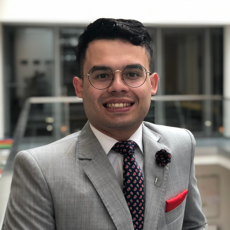
Student ambassador Jonán Monroy
I was born and raised in a small mountain city called Jalapa, in the eastern part of Guatemala where it's green and pleasantly warm. I grew up the child of Pentecostal pastors, in an environment of constant worship to God and service in the church and society. Six years ago, during my master's in Biblical and Theological Studies, I was inspired by two courses by Klaas Bom and Hans de Wit. I wanted to explore the possibility of constructing a Pentecostal theology which is aware of the Latin American reality, so I decided to apply for the international master’s degree in theology at the PThU.
Impact of Christian faith in Guatamala
As a Pentecostal, faith is very important to me because it is the crucial element to be aware of who God is, the foundation of life. Unfortunately, in Guatamala, the impact of the Christian faith is lacking. We have the highest rate of Christians in Latin America, but the Christian faith has been understood in a dualistic way. That is: the spirit is good, but the body is not. Because of that, material realities necessary for life are being ignored. Pentecostalism in Guatamala proposes a lifestyle that integrates the spirit and the body, which can result in a more concrete commitment to the reality of the Guatemalan church and society. This means the body is the place where God is encountered and from where the transformation of society is possible, with new possibilities for the good life.
Open to theological discussion and construction
I was admitted at the PThU in 2020, in the middle of the corona pandemic, and I felt welcome from the first moment I learned about the university. In addition to Professor Bom, international officer Albert Nijboer did an exceptional job accompanying and guiding me through the admission and visa process. He was with me every step of the way until my arrival. In general, the PThU staff provided a pleasant environment for me to integrate into a demanding but complete Master’s degree and lifestyle in a new city. In an atmosphere of dialogue in which my opinion was taken seriously, the professors guided me to improve my academic skills, but also to broaden my vision of life, the church, and society. To envision a better, hopeful future.
At the international student housing where I stayed, I did not only find a place to live, but I found a family. Friends and fellow students met to talk about any subject, share meals, play games, take care of each other, celebrate our achievements and accompany each other in difficult times. It was a space of love, friendship, and care.
Doctoral research into embodying the good life
After finishing my studies, I returned home to join the pastoral and educational work in my country, then returned for a PhD at the PThU. In my doctoral research I hope to bring my initial interest in embodied Christianity to a new level. I'm looking to bring to academic discussion the testimonies of Pentecostal believers who express their encounter with God, the embodied signs that accompany the experience, and the conviction this experience produces to explore new forms of Christian life and commitment to the transformation of the society. And to analyse how God and the good life can be re-signified taking the body as the starting point: the closer we are to our bodies, the more possible the good life is.
The PThU offers me a great environment to perform my research: an intercultural environment open to theological discussion and construction, where I can propose new forms of theological reflection, and develop personally and academically.
